2019高中英语Unit12CultureShockSectionⅠWarm_up
高中英语北师大版高一下册《Unit 12 Section I Warm-up Visiting Br

Unit 12 Culture Shock
Section I Warm-up & Visiting Britain
教学课件
Unit 12 Culture Shock
Section I Warm-up & Visiting Britain
新课导学 自主探究
板块
语言点一 单词集释
(1)You can only eat English food in London.
()
(2)Aunt Mei is visiting for one week.
()
(3)You don't always need to leave a tip after a meal in a
restaurant.
ቤተ መጻሕፍቲ ባይዱ返回
I think we should consider □8 ______ in the Englishcountryside for a few nights so as to enjoy hiking and taste some mushrooms. Don't forget to bring a warm coat for it can get □9 ______ cold and foggy here. One last thing, don'tworry about how to get along with
返回
B.Do you know the following famous places and people of the UK? Please match the following pictures with their names.
2019高中英语 Unit 12 Culture Shock Section Ⅰ Reading(Ⅰ) (Warm-up
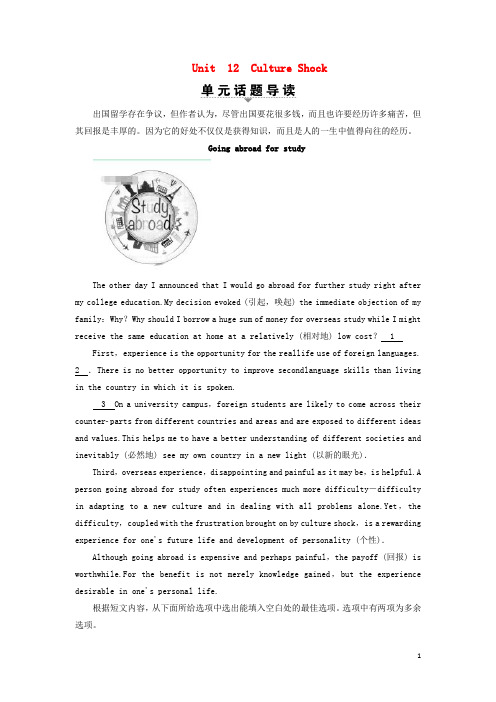
Unit 12 Culture Shock出国留学存在争议,但作者认为,尽管出国要花很多钱,而且也许要经历许多痛苦,但其回报是丰厚的。
因为它的好处不仅仅是获得知识,而且是人的一生中值得向往的经历。
Going abroad for studyThe other day I announced that I would go abroad for further study right after my college education.My decision evoked (引起,唤起) the immediate objection of my family:Why?Why should I borrow a huge sum of money for overseas study while I might receive the same education at home at a relatively (相对地) low cost? 1 First,experience is the opportunity for the reallife use of foreign languages.2 .There is no better opportunity to improve secondlanguage skills than living in the country in which it is spoken.3 On a university campus,foreign students are likely to come across their counterparts from different countries and areas and are exposed to different ideas and values.This helps me to have a better understanding of different societies and inevitably (必然地) see my own country in a new light (以新的眼光).Third,overseas experience,disappointing and painful as it may be,is helpful.A person going abroad for study often experiences much more difficulty-difficulty in adapting to a new culture and in dealing with all problems alone.Yet,the difficulty,coupled with the frustration brought on by culture shock,is a rewarding experience for one's future life and development of personality (个性).Although going abroad is expensive and perhaps painful,the payoff (回报) is worthwhile.For the benefit is not merely knowledge gained,but the experience desirable in one's personal life.根据短文内容,从下面所给选项中选出能填入空白处的最佳选项。
2019高中英语Unit12CultureShockSectionⅡWarm_up
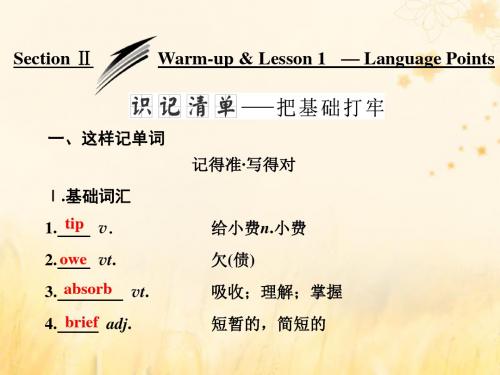
③Please accept our apology for the inconvenience this matter has given you. 对此事给您带来的不便,请接受我们的歉意。 ④I owe you an apology for the damage I have done to your flat. 我应该为损坏您的房子的事向您道歉。
absorb vt. 吸收;理解,掌握,吞并
absorb one’s attention (be) absorbed in (doing) sth.
吸引某人的注意力 专心于/全神贯注于(做)某事
①The clever girl absorbed all the knowledge his teacher could give
her. 这个聪明的小女孩掌握了老师教给她的所有知识。
② Absorbed (absorb) in painting, John didn’t notice evening
approaching.
(2015·天津高考单选)
由于专心于绘画,约翰没有注意到夜幕正在降临。
③The first Chinese woman astronaut Liu Yang absorbed the whole
as a result 因此,所以
(1)as a result of 由于……的结果
1.(教材P36)I certainly owe you an apology for not writing more often. 没有经常给您写信,我的确应该向你道歉。
apology n. 道歉,认错
(1)make an apology to sb. for sth. 因某事向某人道歉
高中英语 Unit 12 Culture Shock Section Ⅰ Warm-up Less

Unit 12 Culture ShockSection_ⅠWarmup & Lesson 1 — Prereading[原文呈现] Dear Aunt Mei ,I can ’t believe I ’ve been in London for 6 months already! I certainly owe ①you an apology ② for not writing more often. I ’ve just been so busy studying andtrying ③ to absorb ④ all the new things around me — I think I ’m still experiencing ⑤ culture shock.There is so much here that is different from home. But you ’ll soonexperience it all yourself! I wish ⑥ your visit wasn ’t going to be so brief ⑦ butthere ’s a lot we can do and see in a week. I ’m just so glad you can afford ⑧ tovisit me and I refuse to let you pay for anything while you ’re here!I don ’t know what your expectations ⑨ are of London, but knowing that you ’ve never travelled outside of Asia ⑩, I thought I ’d tell you a bit about what youcan expect to find ⑪.[读文清障]①owe /əʊ/vt .欠(情、债等)owe ... to sb./owe sb....欠某人……,把……归功于某人 ②apology /ə'p ɒl əd ʒi/n .道歉,认错 make an apology to sb. for (doing) sth.因(做了)某事向某人道歉③be busy doing sth.忙于做某事④absorb /əb's ɔːb/vt .理解,掌握;吸收be absorbed in 全神贯注于……⑤experience v .体验,经历;n .[U]经验;[C]经历⑥wish 后接从句,从句要使用虚拟语气。
高中英语 Unit 12 Culture Shock Section Ⅰ Warm up Less

Section Ⅰ Warm up & Lesson 1—ComprehendingA卷[学生用书P125(单独成册)]Ⅰ阅读理解ABook 1 Elixir written by Eric WaltersTwelveyearold Roth becomes a friend of Dr. Banting and his assistant, Mr. Best, who are doing research on a cure for diabetes(糖尿病). She finds herself torn between her sympathy for the animals being experimented on and her friendship with Banting and Best.Book 2 George Washington Carver written by Elizabeth MacleodMeet the “Peanut(花生)Specialist〞, George Washington Carver, the inventor and professor who made over 325 products out of peanuts. Through his agricultural research, he also greatly improved the lives of countless black farmers in the southern United States. See also Macleod’s Albert Einstein: A Life of Genius. Book 3The Inuit Thought of It: Amazing Arctic Innovations written by Alootook Ipellie & David MacDonaldExplore more than 40 ideas necessary to Inuit survival. From ideas familiar to us today to inventive concepts that shaped their lives, celebrate the creativity of a remarkably intelligent people. Also see other books: TheChineseThoughtofIt by Tingxing Ye and ANativeAmericanThoughtofIt by Rocky Landon and David MacDonald. Book 4 Made in Canada:101 Amazing Achievements written by Bev Spencer What things do we use daily that have a Canadian connection? Here are 101 common things that were invented in Canada or by a Canadian, including the Blackberry, alkaline(碱性) batteries and the Blue Box recycling program.Book 5 Newton and the Time Machine written by Michael McGowanTenyearold boy Newton has invented a time machine to see dinosaurs up close. But it disappears on a test run with his two huge friends, King Herbert and Queen Certrude, can he save them before time runs out?【解题导语】本文介绍了四本书的具体情况。
Unit 12 Culture Shock Warm-up, L1, L2 单词拼写
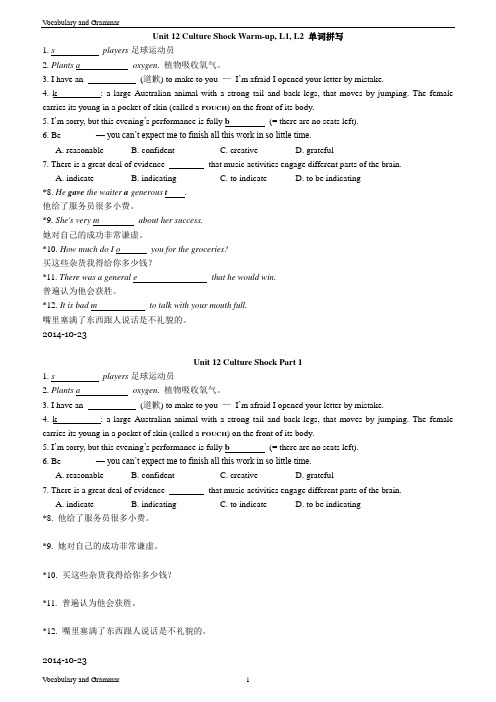
Unit 12 Culture Shock Warm-up, L1, L2 单词拼写1. s players足球运动员2. Plants a oxygen.植物吸收氧气。
3. I have an (道歉) to make to you —I’m afraid I opened your letter by mistake.4. k : a large Australian animal with a strong tail and back legs, that moves by jumping. The female carries its young in a pocket of skin (called a POUCH) on the front of its body.5. I’m sorry, but this evening’s performance is fully b(= there are no seats left).6. Be _______ —you can’t expect me to finish all this work in so little time.A. reasonableB. confidentC. creativeD. grateful7. There is a great deal of evidence that music activities engage different parts of the brain.A. indicateB. indicatingC. to indicateD. to be indicating*8.He gave the waiter a generous t .他给了服务员很多小费。
*9. She's very m about her success.她对自己的成功非常谦虚。
*10. How much do I o you for the groceries?买这些杂货我得给你多少钱?*11. There was a general e that he would win.普遍认为他会获胜。
2019_2020学年高中英语Unit12CultureShockWarm_up
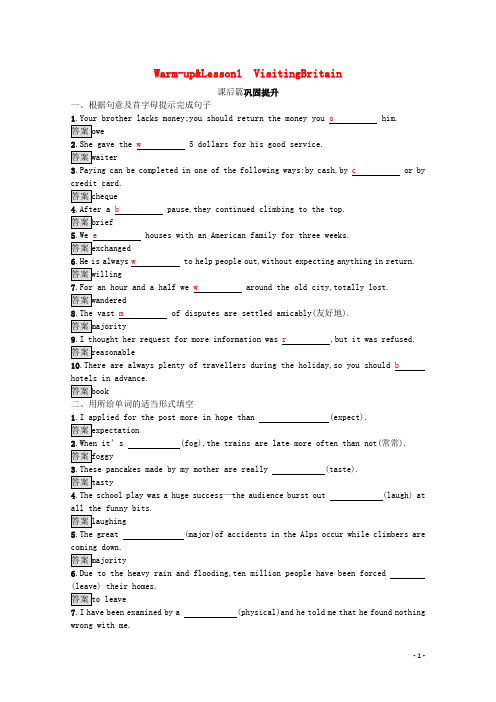
Warm-up&Lesson1 VisitingBritain课后篇巩固提升一、根据句意及首字母提示完成句子1.Your brother lacks money;you should return the money you o him.2.She gave the w 5 dollars for his good service.3.Paying can be completed in one of the following ways:by cash,by c or by credit card.4.After a b pause,they continued climbing to the top.6.He is always w to help people out,without expecting anything in return.7.For an hour and a half we w around the old city,totally lost.8.The vast m of disputes are settled amicably(友好地).9.I thought her request for more information was r ,but it was refused.10.There are always plenty of travellers during the holiday,so you should b hotels in advance.二、用所给单词的适当形式填空1.I applied for the post more in hope than (expect).2.When it’s (fog),the trains are late more often than not(常常).3.These pancakes made by my mother are really (taste).4.The school play was a huge success—the audience burst out (laugh) at all the funny bits.5.The great (major)of accidents in the Alps occur while climbers are coming down.6.Due to the heavy rain and flooding,ten million people have been forced (leave) their homes.7.I have been examined by a (physical)and he told me that he found nothing wrong with me.8.We would like to offer our (apology) for the delay to your flight today.三、完成句子1.这个小男孩坐在池塘边上,专注地看着鱼儿。
高中英语 Unit 12 Culture Shock Period One Warm up Read
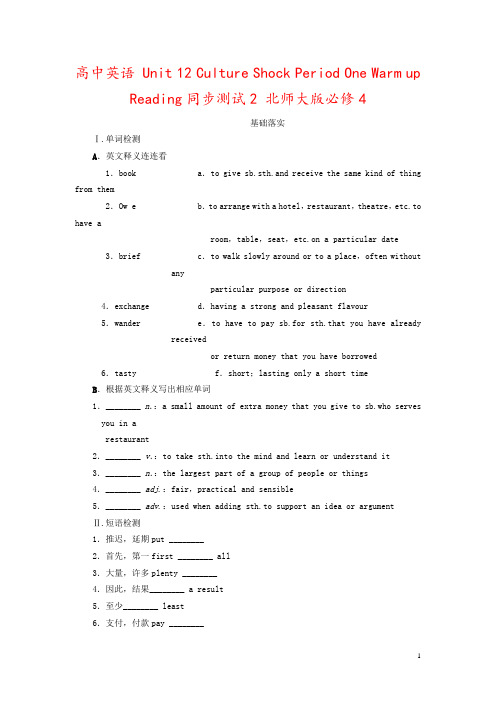
高中英语 Unit 12 Culture Shock Period One Warm up Reading同步测试2 北师大版必修4基础落实Ⅰ.单词检测A.英文释义连连看1.book a.to give sb.sth.and receive the same kind of thing from them2.Ow e b.to arrange with a hotel,restaurant,theatre,etc.to have aroom,table,seat,etc.on a particular date 3.brief c.to walk slowly around or to a place,often withoutanyparticular purpose or direction4.exchange d.having a strong and pleasant flavour5.wander e.to have to pay sb.for sth.that you have alreadyreceivedor return money that you have borrowed 6.tasty f.short;lasting only a short timeB.根据英文释义写出相应单词1.________ n.:a small amount of extra money that you give to sb.who serves you in arestaurant2.________ v.:to take sth.into the mind and learn or understand it3.________ n.:the largest part of a group of people or things4.________ adj.:fair,practical and sensible5.________ adv.:used when adding sth.to support an idea or argumentⅡ.短语检测1.推迟,延期put ________2.首先,第一first ________ all3.大量,许多plenty ________4.因此,结果________ a result5.至少________ least6.支付,付款pay ________7.事先________ advance8.嘲笑某人laugh ________ sb.9.习惯于get used ________10.为某人提供食宿put sb.________Ⅲ.用所给词的适当形式填空1.There was a general ________(expect) that he would win.2.Honestly I thought the fried chicken was ________(taste).3.Karen burst into ________(laugh) on hearing the good news.4.When it’s ________(fog),the trains are late more often than not.5.The great ________(major) of accidents in the Alps occur while climbers are coming down.6.I thought her request for more information was ________(reason),but it was refused.7.I have been examined by a ________(physical) and he told me that he found nothing wrong with me.8.I made no ________(apologize) for what I said—it was a fair comment.Ⅳ.选词填空give up,put off,pay for,in advance,get used to,get confused about1.It’s cheaper if you book the tickets ____________.2.Because of the heavy rain,we had to ____________ the sports meeting.3.When I first went to London,I ________________ the traffic rules,which are different from those in China.4.To my delight,my daughter soon ______________ the new life in university.5.You’d better ____________ smoking or you’ll harm your health greatly.6.If you stay here,I’ll not let you ____________ anything.能力提升阅读理解AGeorge Gershwin,born in 1898,was one of America’s greatest composers.He published his first song when he was eighteen years old.During the next twenty years he wrote more than five hundred songs.Many of Gershwin’s songs wer e first written for musical plays performed in theatres in New York City.These plays were a popular form of entertainment in the 1920s and 1930s.Many of his songs have remained popular as ever.Over theyears they have been sung and played in every possible way—from jazz to country.In the 1920s there was a debate in the United States about jazz music.Could jazz,some people asked,be considered serious music? In 1924 jazz musician and orchestra leader Paul Whiteman decided to organize a special concert to show that jazz was serious music.Gershwin agreed to compose something for the concert before he realized he had just a few weeks to do it.And in that short time,he composed a piece for piano and orchestra which he called Rhapsody in Blue.Gershwin himself played the piano at the concert.The audience were thrilled when they heard his music.It made him worldfamous and showed that jazz music could be both serious and popular.In 1928,Gershwin went to Paris.He applied to study composition(作曲) with the wellknown m usician Nadia Boulanger,but she rejected him.She was afraid that classical study would ruin his jazzinfluenced style.While there,Gershwin wrote An American in Paris.When it was first performed,critics(评论家) were divided over the music.Some called it happy and full of life,to others it was silly and boring.But it quickly became popular in Europe and the United States.It still remains one of his most famous works.George Gershwin died in 1937,just days after doctors learned he had brain cancer.He was only thi rtynine years old.Newspapers all over the world reported his death on their front pages.People mourned the loss of the man and all the music he might have still written.(2013·山东,B)1.Many of Gershwin’s musical works were________.A.written about New YorkersB.composed for Paul WhitemanC.played mainly in the countrysideD.performed in various ways2.What do we know about the concert organized by Whiteman?A.It attracted more people to theatres.B.It proved jazz could be serious music.C.It made Gershwin leader of the orchestra.D.It caused a debate among jazz musicians.3.What did Gershwin do during his stay in Paris?A.He created one of his best works.B.He studied with Nadia Boulanger.C.He argued with French critics.D.He changed his music style.4.What do we learn from the last paragraph?A.Many of Gershwin’s works were lost.B.The death of Gershwin was widely reported.C.A concert was held in memory of Gershwin.D.Brain cancer research started after Gershwin’s death.5.Which of the following best describes Gershwin?A.Talented and productive.B.Serious and boring.C.Popular and unhappy.D.Friendly and honest.BThe United States is one of the few countries in the world that has an official day on which fathers are honored by their children. On the third Sunday in June,fathers all across the United States are given presents,treated to dinner or otherwise made to feel special.However,the idea for creating a day for children to honor their fathers began in Spokane,Washington. A woman by the name of Sonora Smart Dodd thought of the idea for Father’s Day while listening to a Mother’s Day sermon in 1909.Having been raised by her father,Henry Jackson Smart,after her mother died,Sonora wanted her father to know how special he was to her. It was her father that made all the parental sacrifices and was,in the eyes of his daughter,a selfless and loving man. Sonora’s father was born in June,so she chose tohold the first Father’s Day celebration in Spokane,Washington on the 19th of June,1910.In 1924 President Calvin Coolidge declared the third Sunday in June as Father’s Day. Roses are the Father’s Day flowers: red to be worn for a living father and white if the father has died.When children can’t visit their fathers or take them out to dinner,they send a greeting card. Traditionally,fathers prefer greeting cards that are not too sentimental. Most greeting cards are too special so fathers laugh when they openthem. Some give heartfelt thanks for being there whenever the child needed Dad.6.The United States is special in Father’s Day because ________.A.many people celebrate the dayB.only America celebrates the dayC.America makes it an official dayD.all men are honored in America7.At first,Father’s Day was fixed on June 19th because ______.A.Sonora honored her father on her father’s birthdayB.Sonora’s birthday was June 19C.it was decided by the president at that timeD.her mother died on June 198.How many years has passed before Father’s Day became an official day since thefather’s day was celebrated?A. 4 B.4 C.14 D.249.According to the passage,on Father’s Day,______.A.people will wear the same flowers to honor their fathersB.only daughters wear red flowers to honor their fathersC.children must go home to honor their fathersD.fathers are often honored in different ways10.According to the passage,we can infer that Henry Jackson Smart ______.A.was very kind to anyoneB.did a lot for his daughterC.was the first father honored in 1924D.always helped others by giving money答案基础落实Ⅰ.A.1.b 2.e 3.f 4.a 5.c 6.dB.1.tip 2.absorb 3.majority 4.reasonable5.anyhowⅡ.1.off 2.of 3.of 4.as 5.at 6.for 7.in 8.at 9.to 10.up Ⅲ.1.expectation 2.tasty ughter 4.foggy5.majority 6.reasonable 7.physician 8.apologyⅣ.1.in advance 2.put off 3.got confused about4.got used to 5.give up 6.pay for能力提升1.D 2.B 3.A 4.B 5.A 6.C 7.A 8.C 9.D 10.B。
2018-2019学年高中英语 Unit 12 Culture Shock Section Ⅰ Wa
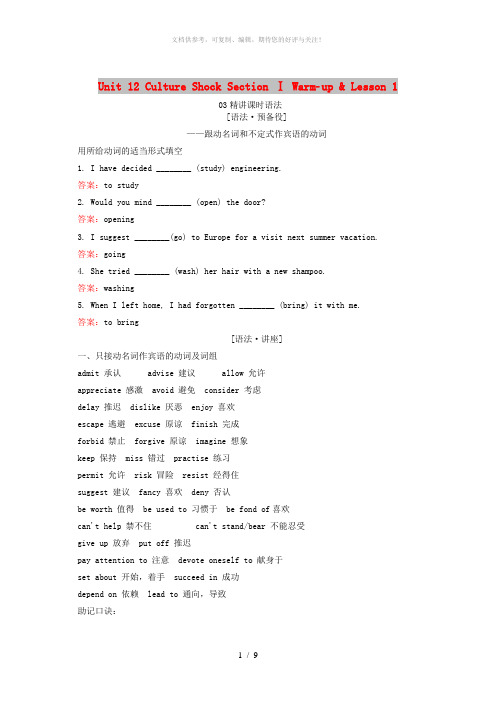
Unit 12 Culture Shock Section Ⅰ Warmup & Lesson 103精讲课时语法[语法·预备役]——跟动名词和不定式作宾语的动词用所给动词的适当形式填空1. I have decided ________ (study) engineering.答案:to study2. Would you mind ________ (open) the door?答案:opening3. I suggest ________(go) to Europe for a visit next summer vacation.答案:going4. She tried ________ (wash) her hair with a new shampoo.答案:washing5. When I left home, I had forgotten ________ (bring) it with me.答案:to bring[语法·讲座]一、只接动名词作宾语的动词及词组admit 承认advise 建议allow 允许appreciate 感激 avoid 避免 consider 考虑delay 推迟 dislike 厌恶 enjoy 喜欢escape 逃避 excuse 原谅 finish 完成forbid 禁止 forgive 原谅 imagine 想象keep 保持 miss 错过 practise 练习permit 允许 risk 冒险 resist 经得住suggest 建议 fancy 喜欢 deny 否认be worth 值得 be used to 习惯于 be fond of喜欢can't help 禁不住can't stand/bear 不能忍受give up 放弃 put off 推迟pay attention to 注意 devote oneself to 献身于set about 开始,着手 succeed in 成功depend on 依赖 lead to 通向,导致助记口诀:[考虑][建议][盼][原谅],→(consider, suggest/advise, look forward to, pardon)[承认][推迟]没得[想]。
Unit 12 Culture Shock Period One Warm
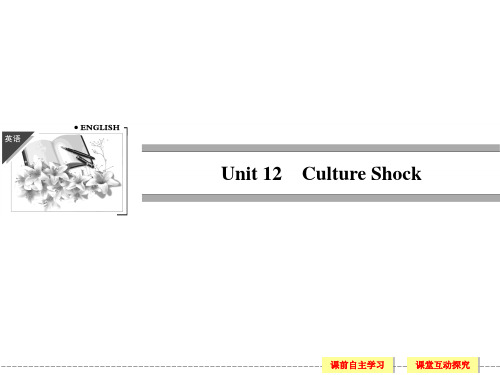
certain subjects that are avoided, or it will be considered too
personal and therefore too impolite. These subjects include a person's age, how much money he or she has, how much his or her clothes and other expensive things are, his or her religion, and his or her personal life.
situations, you may freely act in your own way. This will be
acceptable to those around you.
课前自主学习 课堂互动探究
However, it may be helpful to have a more detailed understanding of the customs which are usually followed in America. Certainly, this subject is too large t12
Culture Shock
课前自主学习
课堂互动探究
American social customs
文前导读:因为美国人的先辈来自世界各地,所以在美国境
内许多社会风俗是兼容并蓄的。如果你第一次去美国,你不 必为不懂那里的风俗而难为情。
课前自主学习
课堂互动探究
Because Americans trace( 追踪 ) their origins from so
高中英语 Unit 12 Culture Shock Section Ⅰ Warm up Less
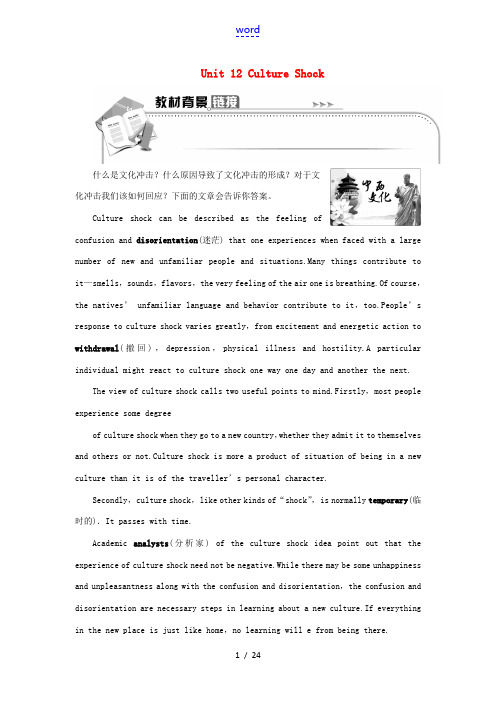
Unit 12 Culture Shock什么是文化冲击?什么原因导致了文化冲击的形成?对于文化冲击我们该如何回应?下面的文章会告诉你答案。
Culture shock can be described as the feeling ofconfusion and disorientation(迷茫) that one experiences when faced with a large number of new and unfamiliar people and situations.Many things contribute to it—smells,sounds,flavors,the very feeling of the air one is breathing.Of course,the natives’ unfamiliar language and behavior contribute to it,too.People’s response to culture shock varies greatly,from excitement and energetic action to withdrawal(撤回),depression,physical illness and hostility.A particular individual might react to culture shock one way one day and another the next.The view of culture shock calls two useful points to mind.Firstly,most people experience some degreeof culture shock when they go to a new country,whether they admit it to themselves and others or not.Culture shock is more a product of situation of being in a new culture than it is of the traveller’s personal character.Secondly,culture shock,like other kinds of“shock”,is normally temporary(临时的).It passes with time.Academic analysts(分析家) of the culture shock idea point out that the experience of culture shock need not be negative.While there may be some unhappiness and unpleasantness along with the confusion and disorientation,the confusion and disorientation are necessary steps in learning about a new culture.If everything in the new place is just like home,no learning will e from being there.Section ⅠWarmup & Lesson 1—prehending[基础词汇]1.owe vt.欠(情、债等)2.absorb vt. 理解,掌握;吸收3.exchange vt. 兑换,交换4.cheque n. 支票5.wander vi. 漫游,闲逛6.anyhow adv. 总之,反正;不管怎样7.book vt. 预约,预订[拓展词汇]8.brief adj. 短暂的,简短的→briefly adv.简短地9.expectation n.期待的事物,预期→expect vt. 期待10.tasty adj. 美味的→taste n. 口味11.laughter n. 笑;笑声→laugh vi. 大笑12.majority n. 大半,大多数→major adj.主要的13.reasonable adj. 合理的,正当的→reason n. 原因1.get__used__to习惯于2.first__of__all首先3.as__a__result结果4.at__least至少5.look__forward__to期待6.put__sb.__up为某人提供膳宿7.give__up放弃8.put__off推迟1.wish后从句中的虚拟语气I wish your visit wasn’t__going__to__be__so__brief(不会这么短) but there’sa lot we can do and see in a week.2.现在分词作定语There are people from all over the world living__here(住在这里的) and as a result,there are many international restaurants.3.不定式作状语To__avoid__getting__confused(为了避免困惑) about the British tipping system,you need to check your bill to see if a tip is included or not.4.even though即使But even__though__some__British__people__are__quite__strange(尽管有些英国人有点儿奇怪),the majority of them are really friendly and I’ve made some good friends.ⅠRead the text carefully and choose the best answer according to the text.1.The letter to Aunt Mei was written________.A.before Aunt Mei’s visit to LondonB.during Aunt Mei’s visit to LondonC.after Aunt Mei’s visit to LondonD.until Aunt Mei’s visit to London2.Xiaojin was writing the letter to________.A.make an apology to Aunt MeiB.thank Aunt Mei for her visit to herC.invite Aunt Mei to visit LondonD.tell Aunt Mei something about London3.When hiking in the English countryside,one had better________.A.not wander through the fieldsB.not eat the mushrooms he/she picksC.wear warm clothesD.listen to the weather report before going4.From the letter,we know many things about Britain EXCEPT________.A.what for breakfastB.tipping systemC.educationD.weather答案:1-4.ADCCⅡAnalyze the following difficult sentences in the text.1.I wish your visit wasn’t going to be so brief but there’s a lot we can do and see in a week.本句是一个由but连接的________句。
北师大版高中英语必修四 Unit 12 Culture shock Warm-up and le

Unit 12 Culture shock Warm-up and lesson 1Objectives☆Read a letter; magazine pages and what people say on radio show.☆Talk about different cultures and manners and do role plays.☆Listen to different accents, and interview and some dialogues.☆Write an informal letter.☆Learn about verbs followed by –ing form or infinitives and Present Participles.I. Listening: Listen to three people taking. Which country are they from?Tape script1. Our typical way of life? Well, we’re a beach culture, you k now. We spend a lot of time a t the beach, surfing, swimming, eating, partying-we even have our Christmas dinner on the be ach, you know! It’s the weather, you see, always lots of sunshine. And as for free we are j ust crazy about sport-cricket, rugby, tennis. I guess most of us spend our holidays on the c oast in our country-it’s very expensive to go abroad, you know. Everywhere’s just so far a way!2. Well, it’s a big country, so it’s kind of hard to say what’s typical. Like the weather -we’ve got all kinds of different climates. Our way of life, well, I guess it’s fast, so t he food is fast, too, lots of hamburgers and hot dogs. What else? Er, I guess we watch a lot of TV in our free time-there are hundreds of channels on 24 hours a day. Er, we go to the m ovies a lot, too. And sport is very big. Our basketball and football stars earn millions of dollars. Most of us go on holiday in our own country, it’s so big and there are so many won derful places to visit. You should come and visit us!3. It’s difficult to say what is typical, as we’ve become such a multicultural society. Ou r weather hasn’t changed though and people still spend a lot of time talking about it! In t erms of food, our traditional roast beef or fish and chips are not as popular as they used t o be. People eat a lot more “international〞 food these days: Italian food, Indian food, th at kind of thing. Free time? If you go to a park any weekend, you’ll see lots of people jog ging, walking or fishing. There are a lot of fitness fanatics! We like watching sport too, e specially football, though our national teams always seem to lose! A lot of us go abroad for our holidays every year. Greece and Italy are the most popular destination, probably becaus e the weather’s so nice. There we are. I’ve mentioned the wea ther again!II. Talking: Which things are very different from where you live? Which things would you lik e to dislike?Lesson 1 Visiting BritainTeaching aims:To practise using verbs+ing form or infinitivesTo practise reading a text and identifying paragraph topicsTeaching difficulties:To practise using verbs+ing form or infinitivesTeaching Aids: computer and cassetteTeaching procedures:I. Warming upT: What do you know about Britain and the British people ? Can you introduce Britain nationa l flay? Can you name national Britain song〞 ( God Save the Queen)II. Reading: After reading the text ask the question “Will the text mainly introduce these knowledge?〞 again. ( No! The text introduce to us how different culture it is between us. ) Answer the following questions:1. In Britain how do you leave a tip?2. If you don’t get used to western food in Britain what should you do?3. What does the text mainly introduce?4. What do the British eat for breakfast?5. How much money do you should take for visiting Britain?6. Do you often laugh after listening to a joke in Britain?Answers:1.First check your bill to see if a tip is included or not. If it isn’t, leave 10% of the b ill-even a bit more if the service is good.2.Every town in Britain has at least one Chinese restaurant.3. humor, tip, food, money, accommodation4. Bacon and eggs with a few slices of toast5. Traveller’s cheques6.You don’t think anything funny.III. Language points1. at least 至少That building must be at least 200 years old. 那座建筑至少有二百年的历史.Birds use at least half of the air they take in to cool their bodies.鸟儿至少要使用它们吸入空气的一半来使自己降温.2. get used to + n /v-ing 习惯于……I’ve got used to the hot food here. 我已习惯了这里辣的食物。
2018_2019学年高中英语Unit12CultureShockSectionⅠWarm_up
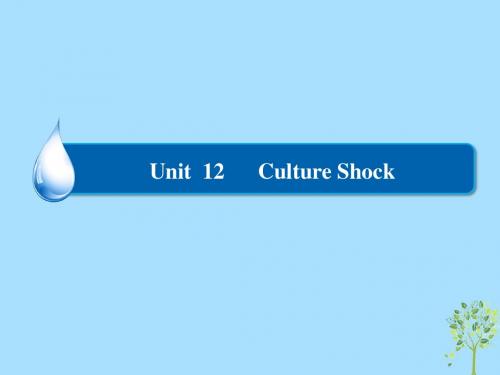
Now when a person enters a strange culture, all or most of these familiar clues are removed. He or she is like a fish out of water. No matter how broadminded or full of goodwill you may be, a series of props have knocked from under you, followed by a feeling of frustration and anxiety. People react to the frustration④ in much the same way. First they reject the environment which causes the discomfort. When foreigners in a strange land get together to grumble⑤ about the host country and its peopluffering from culture
Unit 12
Culture Shock
Questions: 1. What causes culture shock? 2. What are the two main culture shock symptoms? 3. What do you know is going to be discussed after this passage?
文化休克的起因和症状 文化休克是突然移居国外的人的一种职业病。像大多数疾 病一样,它有自己的征兆。 文化休克是由于失去我们熟悉的标志和社会环境而导致的 焦虑。这些标志包括我们熟悉的日常生活,遇到别人知道何时 握手,说些什么,知道什么时候如何给小费,如何购物,何时 接受或拒绝邀请,何时严肃何时放松。这些标志是我们成长过 程中一直遵守的。我们依靠这些思想和标志,成为我们的潜意 识。
【步步高】-高中英语 Unit 12 Culture Shock Period One Warm up Reading课件 北师大版必修4
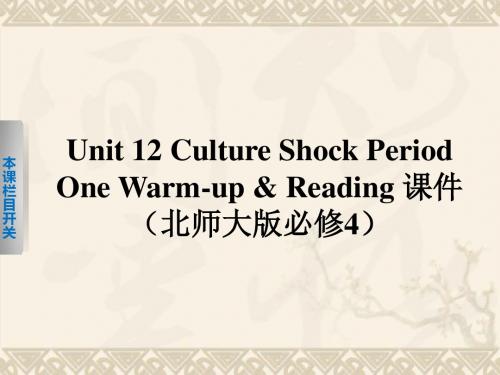
话题导入
4.Which of the following facts about culture shock is TRUE? A.The successful ones in their communities have less difficulties in a foreign environment.
话题导入
根据上文完成下列各题 1.The main purpose of the text is________. C A.to take pity on the homesick B.to share his feeling about staying abroad
本 课 栏 目 开 关
C.to introduce the knowledge of culture shock D.to encourage and cheer up the culture shock sufferers 2.What does the phrase “ adjust to” in Paragraph 1 probably mean? A.Get used to. C.Protect. B.Get tired of. D.Appreciate.
本 课 栏 目 开 关
post office or the transportation—may be difficult to work out.The simplest things seem to be big problems.The language may be difficult. Who feels culture shock? Everyone does in this way or that.But culture shock surprises most people.Very often the people having the worst culture shock are those who have never had any difficulties in their home countries and been successful in their communities.
2019高中英语 Unit 12 Culture Shock Section Ⅱ Language Points (Ⅰ)(Warm-up
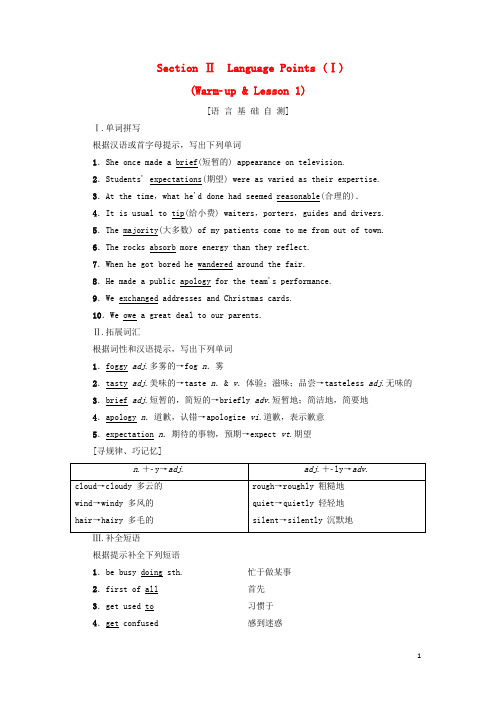
Section ⅡLanguage Points (Ⅰ)(Warmup & Lesson 1)[语言基础自测]Ⅰ.单词拼写根据汉语或首字母提示,写出下列单词1.She once made a brief(短暂的) appearance on television.2.Students' expectations(期望) were as varied as their expertise.3.At the time,what he'd done had seemed reasonable(合理的).4.It is usual to tip(给小费) waiters,porters,guides and drivers. 5.The majority(大多数) of my patients come to me from out of town. 6.The rocks absorb more energy than they reflect.7.When he got bored he wandered around the fair.8.He made a public apology for the team's performance.9.We exchanged addresses and Christmas cards.10.We owe a great deal to our parents.Ⅱ.拓展词汇根据词性和汉语提示,写出下列单词1.foggy adj.多雾的→fog n.雾2.tasty adj.美味的→taste n.& v.体验;滋味;品尝→tasteless adj.无味的3.brief adj.短暂的,简短的→briefly adv.短暂地;简洁地,简要地4.apology n.道歉,认错→apologize vi.道歉,表示歉意5.expectation n.期待的事物,预期→expect vt.期望[寻规律、巧记忆]根据提示补全下列短语1.be busy doing sth. 忙于做某事2.first of all 首先3.get used to 习惯于4.get confused 感到迷惑5.as a result 因此;结果6.in advance 提前7.owe sb.an apology 欠某人一个道歉8.afford to(do) 支付得起9.be different from 不同于10.pay for 支付Ⅳ.选词填空用上述短语的适当形式填空1.They asked so many questions that I got confused.2.Everything must be planned in advance.3.Happiness lies,first of all,in health.4.The country cannot afford to absorb these losses. 5.Tom has got used to eating with chopsticks.[寻规律、巧记忆](教材P36)I certainly owe you an apology for not writing more often.没有经常给你写信,非常抱歉。
2019高中英语Unit12CultureShockSectionⅠWarm_up
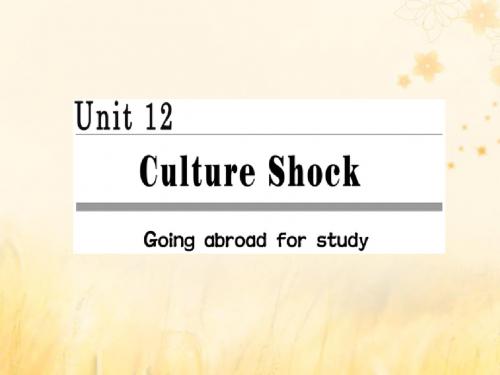
be absorbed in全神贯注于……
[原文呈现]
[读文清障]
around me — I think I’m still ⑤experience v.体验,经历;
experiencing⑤
culture n.[U]经验;[C]经历
shock.There is so much here that ⑥wish后接从句,从句要使用
我简直无法相信我已经在伦敦待了 6 个月了!没有经常给您 写信我的确应该向你道歉。我一直忙于学习,试着了解身边的新 事物——我觉得自己还在经历文化冲击。这儿的很多事情与国内 不一样。但不久您就会亲身体验到它了!我真希望您的来访不会 这么短,但是一周内我们也有许多事情可做,许多地方
可参观。您能抽时间来看我,我真是太高兴了。您在这 儿的期间我不会让您花钱的!
Third, overseas experience, disappointing and painful as it may be, is helpful. A person going abroad for study often experiences much more difficulty — difficulty in adapting to a new culture and in dealing with all problems alone. Yet, the difficulty, coupled with the frustration brought on by culture shock, is a rewarding experience for one’s future life and development of personality (个性).
refuse to let you pay for afford to do sth.抽得出时间
2019版高三英语一轮复习第1部分基础知识解读Unit12CultureShock教师用书北师大版必

Unit 12 Culture Shock(对应学生用书第84页)[单词拼写应用]Ⅰ.考纲单词——会拼写、要识记1.owe vt. 欠(情、债等) 2.brief adj.短暂的,简短的3.exchange vt.兑换,交换4.laughter n. 笑;笑声5.book vt.预约,预订6.novel n. (长篇)小说7.headmaster n. 校长8.request n. 请求9.familiar adj.熟悉的,常见的10.arrival n. 到达,抵达11.aspect n. 方面12.outgoing adj.友好的,乐于交友的13.earthquake n. 地震14.belong vi.适应;属于15.birthplace n. 出生地16.fond adj.喜爱17.broad adj.各种各样的;广阔的18.minority n. 少数,少数民族19.unfair adj.不公平的20.forgive vt.宽恕,饶恕21.cheque n. 支票22.indicate vt.表明;表示23.canteen n. 食堂,餐厅24.appetite n. 胃口,食欲25.detective n. 侦探26.contrary adj.相反的27.preview n. 预告;预演,预展Ⅱ.派生单词——能辨别1.apology n. 道歉,认错→apologize v. 道歉,辩解,赔不是2.absorb vt.理解,掌握;吸收→absorbed adj.被……吸引住的→absorbing adj.吸引人的3.expectation n. 期待的事物,预期→expect vt.期待,预料,指望→expected adj.预期的,预料的4.majority n. 大半,大多数→major adj.主要的;重要的5.reason n. 理由v. 推论→reasonable adj.合理的,正当的6.curious adj.好奇的→curiously adv. 奇怪地;好奇地→curiosity n. 好奇7.move v. 移动;感动→movement n. 动作;活动→movable adj.可移动的→moved adj.感动的→moving adj.令人感动的8.formal adj.正式的→formally adv. 正式地→informal adj.非正式的9.caution n. 小心,谨慎→cautious adj.小心翼翼的,谨慎的10.educate v. 教育→education n. 教育→educator n. 教育者→educated adj.有教养的11.add vt.增加;补充说→addition n. 相加,增加物→additional adj.附加的,补充的12.injure vt.伤害→injury n. 伤害→injured adj.伤害的Ⅲ.语境应用(用所给词的适当形式填空)1.I don't want to get too absorbed(absorb) in modeling.(2017·全国卷Ⅲ)2.In a further twist, birth rate is highest in poorly educated(educate) rural areas.(2017·江苏高考)3.If I have made any mistakes,I'm ready to apologize(apology).4.Since her arrival(arrive) at the company,she has reorganized several departments. 5.Her husband is cautious(caution),never making a swift decision about anything. 6.You should know the additional(addition)responsibilities that are incidental to the job.7.Parents owe their children privacy and respect for their personal belongings(belong).8.The boy is curiously watching what the old man is doing in the garden and he is always curious about the world outside and shows great curiosity about what is going on in nature.(curious)9.The couple moved into the movable house and they felt much moved to see the moving movie after moving into the new house.(movement)10.Three people were killed and five injured in the crash.The doctor said two of the injured had serious injuries.(injure)[拓展联想]单复数同形名词知多少①manners 礼貌②means方法③news 新闻④series丛书⑤Swiss 瑞士人⑥deer鹿⑦beer 啤酒⑧spacecraft航天器“伤害”动词小聚①wound 伤害②hurt受伤③damage 损害④harm伤害⑤impair 损害⑥destroy破坏;损坏“说”之种种①insist 坚持说②joke开玩笑地说③add 继续说④complain抱怨说⑤go on 接着说⑥warn警告说⑦come on 说吧⑧whisper低声说Ⅰ.短语回顾——会默写1.get used to 习惯于2.give...a lift 让……搭车,搭便车3.see...off 给(某人)送行4.belong to 属于5.insist on 坚持,坚决要求6.stare at 盯着看;凝视7.be attached to 附属于8.sound like 听起来像9.in poor condition 状况不好10.be sensitive to 对……敏感11.at least 至少12.contrary to 与……相反13.put/bring an end to 结束14.loads of 许多,大量Ⅱ.语境应用(用上述短语的适当形式填空)1.I found the job tiring at first but I soon got used to it.2.After Tom saw Frank off at the bus station,he went to the post office to post the letter.3.Contrary to most managers' opinion,the young manager voiced his unique view. 4.A final battle put/brought the war to an end,and then the country had been in peace for many years.5.The young man insisted on being sent to where he was most needed.6.The fresh air belongs equally to us all,we should protect it being polluted. 7.That sounds like Bill coming up the stairs.8.They stared at the strange sight in silent wonder.9.I've got loads of friends who're unemployed.10.I've known her at least as long as you have.[拓展联想]无被动语态短语大全①date from 始于②belong to 属于③suffer from 遭受④come true 变成现实⑤take place 发生⑥break out 爆发聚焦“看”相关短语①look around 环顾;四下察看②look down 俯视;向下看③look up 仰望;抬头往上看④glare at 怒视⑤stare at 盯着看;凝视⑥glance at 浏览;粗略地看[句式结构仿写]教材原句——会背诵句式仿写——能应用1.特殊疑问词+不定式Decide where to go on holiday with a friend. 1.曾有一段时间,我不知道如何与同学相处。
- 1、下载文档前请自行甄别文档内容的完整性,平台不提供额外的编辑、内容补充、找答案等附加服务。
- 2、"仅部分预览"的文档,不可在线预览部分如存在完整性等问题,可反馈申请退款(可完整预览的文档不适用该条件!)。
- 3、如文档侵犯您的权益,请联系客服反馈,我们会尽快为您处理(人工客服工作时间:9:00-18:30)。
Unit 12 Culture ShockThe other day I announced that I would go abroad for further study right after my college education. My decision evoked (引起,唤起) the immediate objection of my family: Why? Why should I borrow a huge sum of money for overseas study while I might receive the same education at home at a relatively (相对地) low cost? My answer is: in addition to knowledge, I can gain experience that those who stay at home will never have.First, experience is the opportunity for the reallife use of foreign languages. While a person can study a foreign language at home, the effect can never be compared with constant use of the language in everyday life. There is no better opportunity to improve secondlanguage skills than living in the country in which it is spoken.Second, living and studying abroad offers me a different perspective (角度) of the world. On a university campus, foreign students are likely to come across their counterparts from different countries and areas and are exposed to different ideas and values. This helps me to have a better understanding of different societies and inevitably (必然地) see my own country in a new light (以新的眼光).Third, overseas experience, disappointing and painful as it may be, is helpful. A person going abroad for study often experiences much more difficulty — difficulty in adapting to a new culture and in dealing with all problems alone. Yet, the difficulty, coupled with the frustration brought on by culture shock, is a rewarding experience for one’s future life and development of personality (个性).Although going abroad is expensive and perhaps painful, the payoff (回报) is worthwhile. For the benefit is not merely knowledge gained, but the experience desirable in one’s personal life.Section_ⅠWarmup & Lesson 1 —Prereading[原文呈现]Dear Aunt Mei,I can’t believe I’ve been in London for 6 months already! I certainly owe①you an apology② for not writing more often. I’ve just been so busy studying and trying③to absorb④all the new things around me —I think I’m still experiencing⑤culture shock.There is so much here that is different from home. But you’ll soon experience it all yourself! I wish⑥ your visit wasn’t going to be so brief⑦ but there’s a lot we can do and see in a week. I’m just so glad you can afford⑧ to visit me and I refuse to let you pay for anything while you’re here!I don’t know what your expectations⑨ are of London, but knowing that you’ve never travelled outside of Asia⑩, I thought I’d tell you a bit about what you can expect to find⑪.[读文清障]①owe/əʊ/vt.欠(情、债等)owe ... to sb./owe sb....欠某人……,把……归功于某人②apology/ə'pɒlədʒi/n.道歉,认错make an apology to sb. for (doing) sth.因(做了)某事向某人道歉③be busy doing sth.忙于做某事④absorb/əb'sɔːb/vt.理解,掌握;吸收be absorbed in全神贯注于……⑤experience v.体验,经历;n.[U]经验;[C]经历⑥wish后接从句,从句要使用虚拟语气。
表示与现在相反的假设时,从句中的谓语动词应使用过去式。
⑦brief/briːf/adj.短暂的,简短的briefly adv.短暂地,简短地⑧afford vt.抽得出(时间)afford to do sth.抽得出时间做某事⑨expectation/ˌekspek'teIʃn.期待的事物,预期⑩现在分词短语作原因状语。
⑪I'd tell you a bit about ...是thought的宾语从句,省略了that;该从句中又含有what引导的宾语从句,作介词about的宾语。
is such an international city. There are people from all over the world living here ⑬ and as a result⑭, there are many international restaurants. Do you know that almost every town in Britain has at least one Chinese restaurant? But British people hardly ever eat Chinese food for breakfast. You’re going to have to get used to⑮bacon ⑯ and eggs with a few slices⑰ of toast⑱ for breakfast over here, Aunt Mei!⑫first of all首先,第一at first起初,首先⑬living here是现在分词短语作后置定语,修饰people。
⑭as a result结果,因此as a result of由于,作为……的结果⑮get used to“习惯于”,to为介词。
⑯bacon/’beIkən/n.腌猪肉,熏猪肉⑰slice/slaIs/n.薄片,片⑱toast/təʊst/n.烤面包;祝酒,干杯这里有许多国际性的餐馆。
至少有一家中国餐馆吗?但是英国人吃早饭几乎从不吃中餐。
And a word of advice. To avoid getting confused about the British tipping○system○22, you need to check your bill to see if a tip is included or not. If it25—even isn’t, I suggest○23 leaving 10% of the bill for the waiter○24 or waitress○26 a bit more if the service is good. Talking of money —it’s really easy to exchange○27 at banks or hotels so I advise you to get some of those before traveller’s cheques○you come.I think we should consider○28 staying in the English countryside for a few nights30 through the fields and even pick a as I know you enjoy hiking○29. We can wander○few mushrooms○31 to have with our breakfast! I have learnt which ones are tasty○32 and safe to eat so we won’t risk○33 getting sick! And don’t forget a warm coat! It can get pretty○34 cold and foggy○35 in this country.,⑲a word of advice“一点建议/劝告”,在此相当于a piece of advice。
